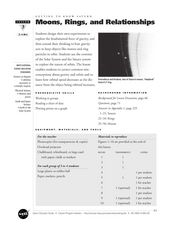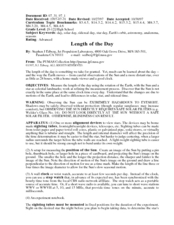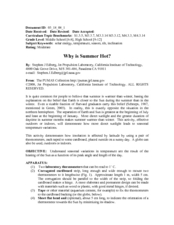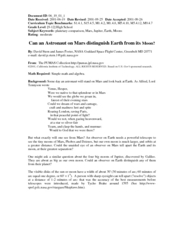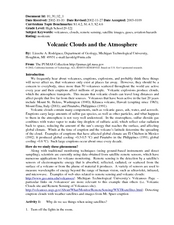Curated OER
Getting to Know Saturn: Moons, Rings, and Relationships
Students identify the different objects that orbit Saturn. In this space science lesson, students plot the graph of orbital speed and distance. They explain why planets and asteroids remain in orbit around the sun.
Curated OER
Mars Rover Landing Site
In this Mars Rover Landing worksheet, students are given an image of Mars near the Bonneville Crater. Students determine the image scale in the diagram and use it to find the diameter of the Bonneville Crater, the width of the Rover's...
Curated OER
Color and Spectrum
Young scholars examine the spectra of light sources that have similar colors. In this light activity students complete an activity using various lights in the classroom and discuss the colors and the heat generated.
Curated OER
Length of the Day
Students investigate how the Earth's rotation affect the length of day. In this earth science lesson, students construct a sighting apparatus and record their observations over a few days. They analyze data collected and formulate a...
Curated OER
Making Moths
Students study the Gregorian Calendar and its historical significance.In this calendar lesson students create a calendar design for an imaginary planet.
Curated OER
The Moon Orbits the Sun?!?!
Students calculate the strength of gravitational force exerted on the moon by the sun and earth. In this orbital instructional activity students view a demonstration to see the gravitational forces between bodies.
Curated OER
Why is Summer Hot?
Students examine how variations in temperature are due to the Sun and length of day. For this solar lesson students complete a lab activity using thermometers and artificial sunlight to see how the earth is heated.
Curated OER
When a Ruler is Too Short
Learners measure distances using parallax. In this math lesson, students explain how this method helped astronomers with their studies of the solar system. They determine the length of their arm using parallax and compare it with other...
Curated OER
Climate Change
Ninth graders compare the Arctic and Antarctic. In this climate lesson plan students work in groups, research and complete an oral report or a poster.
Curated OER
Can Photosynthesis Occur at Saturn?
Students identify the different requirements for photosynthesis to take place. In this space science lesson, students simulate conditions in Saturn to investigate if photosynthesis is possible there. They use data and observations...
Curated OER
There's Air in There!
Students attempt to blow a wad of paper into a soda bottle. In this physics lesson, students discover that air pressure inside of a soda bottle prevents new air from going in.
Curated OER
Spitzer Explores a Dying Star
In this dying star worksheet, learners read about the Spitzer Space Telescope that detected the dying star-Messier-57. Students solve 6 problems including determining the total power produced by the dying star, they find the total mass...
Curated OER
The Solar Neighborhood within 17 Light Years!
In this distance between stars worksheet, students plot the distance between the sun and 11 other stars on a 2 dimensional grid using a protractor and a ruler. They determine the distances between various stars and they find the shortest...
Curated OER
Can an Astronaut on Mars Distinguish Earth from its Moon?
Students explore the possibility of being on Mars and being able to identify the Earth. For this space lesson students complete a set of calculations to see if this is possible.
Curated OER
Determining the Altitude of Iridium Flares
Learners examine what iridium flares are and when they occur. In this iridium flare instructional activity students complete an activity to see how far overhead Iridium satellites are.
Curated OER
Grandpa's Social Security
Students examine social security and how the process works at different ages.In this retirement lesson students determine how long a retired person has to live to get the same benefits at different ages.
Curated OER
Mixing and Stirring
Students experience mixing through dancing. In this physical science lesson plan, students not only dance to show mixing but also demonstrate mixing and stirring by combining milk and chocolate milk.
Curated OER
Pilots, Airplanes, and the Tangent of Three Degrees
Students explore how to use trigonometry in the aviation field. In this aviation lesson students complete trigonometry equations that show what planes should do to land their airplanes.
Curated OER
Sand or Rock? Finding Out From 1,000 km
Students observe how measurements are made with different instruments. In this remote sensing lesson students investigate the physical state of surfaces including the surfaces of the solar system.
Curated OER
The Mathematical Implications of Lying
Students explore how statistics can be interpreted in different ways. In this probability lesson students complete a class lab activity then discuss their findings.
Curated OER
Volcanic Clouds and the Atmosphere
Young scholars examine how scientists monitor volcanoes. In this volcano lesson students complete several activities including why we see things when using satellites.
Curated OER
Teaching Atomic Structure Using Cooperative Learning
Individuals in a group of four each take on a different role: atomic number expert, mass number expert, isotope expert, and nuclear atom expert. They teach each other about their area of expertise. As an assessment, a short quiz is...
Curated OER
Mars Pathfinder Egg Drop and Landing
Students construct a pathfinder that could land an egg safely. In this physics lesson, students explain the factors affecting the dynamics of falling objects. They evaluate their pathfinder design.
Curated OER
Noblesville Fall
Learners brainstorm questions based on a given narrative about an actual fallen meteorite. In this earth science instructional activity, students organize their responses into different categories.
